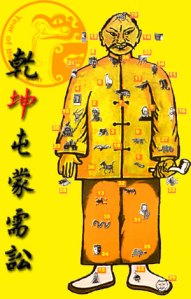One of the most influential aspect of Chinese culture in Trinidad is that of Play Whe. Play Whe came to Trinidad from the traditional ‘Whe Whe’ that was brought by the Chinese immigrants during the mid-nineteenth century. An ancient pastime, it was known as Chinapoo; a numbers game played by persons who were influenced by intuition, superstition, dreams and caprice. No longer in its original form, it has been creolised, acquiring words like Jamette, Crapaud and Corbeau. It has retained one Chinese word albeit corrupted, “Tie Pin,” correctly T’ai P’ing (Heavenly Kingdom).
Nobody really knows how the original Whe Whe, Play Whe’s Predecessor was developed. With human nature being what it is, it is only natural that a play form of ancient Chinese divination methods was invented. The most famous of the Chinese oracles is the I Ching (also called the Book of Changes). It is quite possible that the banker anticipated the community by consulting the I Ching oracle and deciding which mark to ‘buss’ that day. The I Ching is extremly ancient, it was used in the Far East while the western world was still in the Stone Age. The two major Chinese philosophies, Taoism and Confucianism, find their origins in the I Ching. The Chinese oracle numbers convey great symbolism. Applied to a project or intention action, they are the symbols which influence the road to success. Translated into Play Whe marks you can find your lucky numbers in the I Ching signs.
The symbol of the Play Whe is a drawing of the Chinaman jumbie or Chinapoo. His anatomy is divided into some 36 segments, each marked with either mark partner or spirit numbers depending on the chart. Originally Chinese characters were used, but as Chinese is very difficult to learn and pass on, the original Chinese ideograms were creolised, leaving only the original numbers. These numbers all have names and numbers are marks. The derivation of the chart may have sprung from the Chinese belief in the currents, electrical, magnetic and psychic as described in the Yin and Yang philosophy. These currents flow through the universe, the human condition being a reflection of all this and echoing it in microcosm. Play Whe is drawn from this ancient belief system that seeks to interpret and to anticipate the grand plan. Its methods may call upon numerology, astrology, and the associations of ideas with numbers events or even folklore.
Dreams and visions may thus be interpreted to dictate which mark should be played at what time. It is noteworthy that unlike other forms of gaming. Play Whe develops a person’s intuitive faculties by causing him or her to remember dream’s, associative ideas, regard the significance of numbers and attempt to anticipate the coincidental. Play Whe is an amalgam of African, Spanish, French, Amerindian and Chinese influences, beliefs, myths and superstitions. The fact that the creation of Play Whe has brought this ancient game from the cold, may be regarded as another step in the process of the cross-cultural assimilation of the people of Trinidad and Tobago. The overwhelming interest in today’s Play Whe has demonstrated the extent to which the game in its original form has found a place in our national consciousness.
Source: [Play Whe 10th Anniversary Collectors Diary]
Previous Page: Art Next Page: New Wave of Chinese


Pingback: check out this link: | D' Whe
I like this post a lot. Thanks for sharing.